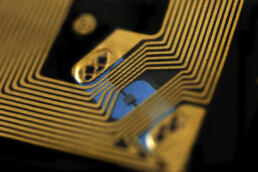Toward hack-proof RFID chips
New technology could secure credit cards, key cards, and pallets of goods in warehouses.
MIT researchers have developed a new type of radio frequency identification (RFID) chip that is extremely difficult to hack.
If such chips were widely adopted, it could mean that an identity thief couldn’t steal your credit card number or key card information by sitting next to you at a café, and high-tech burglars couldn’t swipe expensive goods from a warehouse and replace them with dummy tags.
Texas Instruments has built several prototypes of the new chip, to the researchers’ specifications, and in experiments the chips have behaved as expected. The researchers presented their research this week at the International Solid-State Circuits Conference, in San Francisco.
A virtual “guide dog” for navigation
Low-power chip processes 3-D camera data, could enable wearable device to guide the visually impaired.
MIT researchers have developed a low-power chip for processing 3-D camera data that could help visually impaired people navigate their environments. The chip consumes only one-thousandth as much power as a conventional computer processor executing the same algorithms.
Using their chip, the researchers also built a prototype of a complete navigation system for the visually impaired. About the size of a binoculars case and similarly worn around the neck, the system uses an experimental 3-D camera from Texas Instruments. The user carries a mechanical Braille interface developed at MIT’s Computer Science and Artificial Intelligence Laboratory (CSAIL), which conveys information about the distance to the nearest obstacle in the direction the user is moving.

